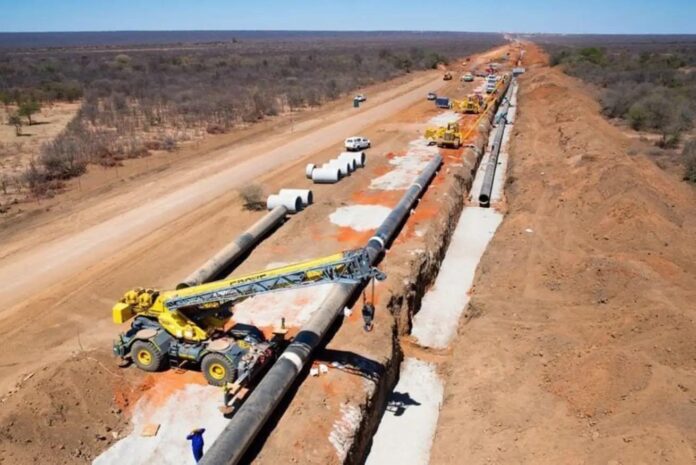Botswana, a nation perpetually parched, stands at a crossroads. Its grandest infrastructure dream, the North-South Carrier (NSC), a lifeline meant to ferry water from the wetter north to the thirsty south, has devolved into a multi-billion Pula nightmare of delays, mismanagement, and staggering cost overruns under the “old” government. Now, the new UDC government is looking to open its doors to private capital to resuscitate an otherwise failed project.
Conceived in the early 90s as Botswana’s answer to chronic water scarcity and a rapidly intensifying climate crisis, the NSC was hailed as the cornerstone of national survival. Its mission: to quench the thirst of burgeoning urban centres like Gaborone, ensuring a consistent supply amidst escalating droughts and dwindling local resources. But two decades on, this vital artery remains clogged, a stark monument to the systemic inefficiencies of the old government.
A River of Red Ink and Broken Promises
The figures are damning. Phase 1 of the NSC, envisioned for completion by 2000, dragged on for five years, riddled with pipe failures, equipment malfunctions, and spiralling costs. What began as a US$350 million (P1.2 billion) endeavour ballooned to P1.5 billion.
Phase 2 paints an even grimmer picture. While the Dikgatlhong Dam, a key component, was commendably completed ahead of schedule, the pipeline work has been a catastrophic failure. A local factory churned out unusable pipes, forcing fresh delays. More egregiously, the Auditor General’s reports reveal a scandalous tapestry of financial mismanagement. The Kanye village connection to the NSC, initially pegged at P680 million, has already swallowed over P1.2 billion – a staggering 74% over contract. Consultancy fees for the Mmamashia-Kanye section exploded from P15 million to a mind-boggling P76 million, a 228% increase.
Adding insult to injury, late payments to contractors led to work stoppages and additional claims, while P719,226 from the auction of project vehicles in Kanye simply vanished from government accounts. These are not isolated incidents; they are symptoms of a deeply entrenched malaise – a toxic cocktail of inadequate planning, acute capacity constraints, weak procurement processes, and a shocking lack of robust financial oversight.
The Dry Season’s Devastating Ripple
The consequences of this epic failure are not merely financial; they are existential. Botswana faces a widening water deficit, with current supply falling nearly 50 million cubic meters short of demand, a gap projected to worsen significantly by 2035. This isn’t just about turning on a tap; it’s about the very fabric of the nation.
Businesses, particularly Small and Medium Enterprises (SMEs), are reeling from constant water shortages, stifling productivity and eroding profits. The manufacturing sector, already battling high utility costs, finds its competitiveness crippled. Regionally, the economic drag of water scarcity is immense, and Botswana is no exception. Every day the NSC remains unfinished, the nation bleeds economic potential. Beyond the balance sheets, the human cost is immeasurable. Rural communities, reliant on rain-fed agriculture, face escalating food insecurity during droughts.
Private Capital: A Catalyst for Growth and Innovation
In a strategic and forward-looking move, the UDC Government is actively inviting private sector participation in the completion and future development of the NSC. Recognising the immense potential of Public-Private Partnerships (PPPs), the government has revitalised its PPP policies, offering attractive incentives such as low tax rates, free profit repatriation, and a dedicated PPP Unit to facilitate seamless collaboration.
This strategic pivot harnesses the power of private capital to bridge funding gaps, introduce cutting-edge expertise, drive efficiencies, and crucially, transfer delivery risks, safeguarding public funds. Models like Build-Own-Operate (BOO) and Build-Own-Operate-Transfer (BOOT) for “Water-as-a-Service” contracts are being explored, promising enhanced accountability and incentivizing quality construction and timely delivery through performance-based payments. Global studies consistently demonstrate that PPPs can significantly reduce construction time and cost overruns, offering a promising trajectory for the NSC.
President Boko’s government acknowledges the importance of a robust and transparent framework to attract serious private investors. The new government is committed to strengthening its technical expertise, clarifying regulatory frameworks, and fostering a climate of unwavering transparency in procurement processes. Past challenges are being actively addressed to build investor confidence and establish Botswana as a reliable and attractive partner for long-term investments.
Unlocking the Future: A Shared Vision for a Water-Secure Botswana
Botswana stands at a pivotal moment, poised to realise the full potential of the North-South Carrier. The UDC government’s proactive embrace of private partnerships represents a significant step forward, demonstrating a clear commitment to leveraging diverse strengths for national benefit.
This renewed focus necessitates sustained action: building institutional capacity, refining legal frameworks, and upholding the highest standards of transparency and accountability. Risks will be equitably allocated, projects meticulously structured, and communities genuinely engaged to ensure inclusive and sustainable development. The global community stands ready to offer support through blended finance and best practices, but the impetus for this vital transformation lies firmly within Botswana’s leadership.
The nation’s future is intrinsically linked to water security. With a collaborative spirit, strategic planning, and unwavering resolve, Botswana is set to unlock the full potential of the North-South Carrier, ensuring a future where every Motswana has access to this fundamental right. The journey is underway, and a more water-secure and prosperous Botswana is on the horizon.



